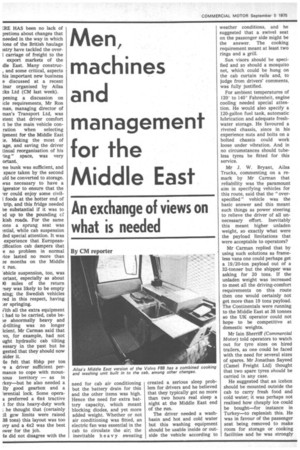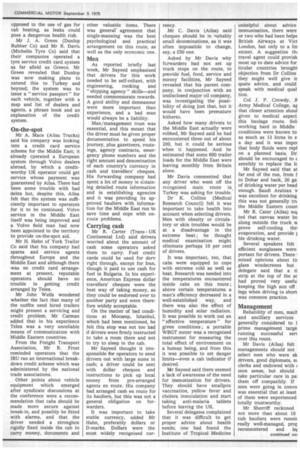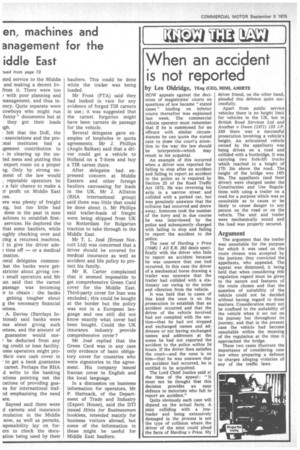en, machines and management for the Middle East
Page 74

Page 75

Page 76

If you've noticed an error in this article please click here to report it so we can fix it.
An exchange of views on what is needed
:RE HAS been no lack of gestions about changes that needed in the way in which ions of the British haulage istry have tackled the overI carriage of freight to the export markets of the die East. Many construe, and some critical, aspects his important new business e discussed at a recent mar organised by Ailsa cks Ltd (CM last week).
pening a discussion on icle requirements, Mr Ron man, managing director of man's Transport Ltd, was stent that driver comfort t be the main vehicle conration when selecting ipment for the Middle East :e. Making the most of age, and saving the driver tinual reorganisation of his ring " space, was very ortant..
tie bunk was sufficient, and space taken by the second uld be converted to storage. was necessary to have a igerator to ensure that the rer could enjoy some civilfoods at the hotter end of trip, and this fridge needed be substantial if it was to id up to the pounding cf kish roads. For the same ions a sprung seat was ntial, while cab suspension Jed special attention. It was experience that European:ification cab dampers that e no problem in normal rice lasted no more than ae months on the Middle t run.
'ehicle suspension, too, was ortant, especially as about 10 miles of the return mey was likely to be empty ning; the Swedish vehicles red in this respect, having :er springing.
nth all the extra equipment t had to be carried, cabs bele abnormally heavy and d-tilting was no longer Icient. Mr Carman said that vo, for example, had not ught hydraulic cab tilting essary in the past but he gested that they should now sider it.
-le felt that 8bhp per ton re a driver sufficient permance to cope with mounsous territory — as in rkey—but he also needed a lly good gearbox and a 'erential lock. Some opera s preferred a 6x4 tractive t for this heavy-duty work ; he thought that (certainly gcw limits were raised 38 tons) this layout was too ivy and a 4x2 was the best ;wer for the job.
le did not disagree with the need for cab air conditioning but the battery drain for this and the other items was high. Hence the need for extra battery capacity, which meant blocking diodes, and yet more added weight. Whether or not air conditioning was fitted, an electric fan was essential in the cab to circulate the air; the inevitable h ea v y sweating created a serious sleep problem for drivers and he believed that they typically got no more than two hours real sleep a night at the Middle East end of the run.
The driver needed a washbasin and hot and cold water but this washing equipment should be usable inside or outside the vehicle according to weather conditions, and he suggested that a swivel seat on the passenger side might be the answer. The cooking requirement meant at least two rings and a grill.
Sun visors should be specified and so should a mosquito net, which could be hung on the cab curtain rails and, to judge from drivers' comments, was fully justified.
For ambient temperatures of 120" to 140° Fahrenheit, engine cooling needed special attention. He would also specify a 120-gallon fuel tank, automatic lubrication and adequate freshwater storage. He favoured a riveted chassis, since in his experience nuts and bolts on a bolted chassis could work loose under vibration. And in no circumstances should tubeless tyres be fitted for this service.
Mr J. W. Bryant, Ailsa Trucks, commenting on a remark by Mr Carman that reliability was the paramount aim in specifying vehicles for this route, said that the " overspecified " vehicle was the basic answer and this meant such things as power steering to relieve the driver of all unnecessary effort. Inevitably this meant higher unladen weight, so exactly what were the payload limitations that were acceptable to operators?
Mr Carman replied that by using such solutions as frameless vans one could perhaps get a 19/20-ton payload out of a 32-tonner but the shipper was asking for 20 tons. If the unladen weight was increased to meet all the driving-comfort requirements on this route then one would certainly not get more than 19 tons payload. The Continentals were running to the Middle East at 38 tonnes so the UK operator could not hope to be competitive at domestic weights.
Mr lain Sherriff (Commercial Motor) told operators to watch out for tyre sizes on hired trailers, as one could be faced with the need for several sizes of spares. Mr Jonathan Sayeed (Camel Freight Ltd) thought that two spare tyres should be carried in any case.
He suggested that an icebox should be mounted outside the cab to carry fresh food and cold water; it was perhaps not realised how cheaply ice could be bought—for instance in Turkey—to replenish this. He was in favour of the passenger seat being removed to make room for storage or cooking , facilities and he was strongly opposed to the use of gas for cab heating, as leaks could pose a dangerous health risk.
Mr J. A. Green (Dunlop Rubber Co) and Mr R. Davis, (Michelin Tyre Co) said that their companies operated a tyre service credit card system as far afield as Greece. Mr Green revealed that Dunlop was now making plans to extend this to Turkey and beyond; the system was to issue a "service passport" for each vehicle, together with a map and list of dealers and agents, a phrase book and an explanation of the credit system.
On-the-spot
Mr A. Mace (Ailsa Trucks) said his company was looking into a credit card service scheme for the Middle East; it already operated a European system through Volvo dealers abroad, by which a creditworthy UK operator could get service whose payment was guaranteed by Ailsa. There had been some trouble with bad debts but, despite this, Ailsa felt that the system was sufficiently important to operators for it to be continued. Volvo service in the Middle East itself was being improved and a Volvo field man had now been appointed to the territory to provide on-the-spot aid.
Mr H. Hahn of York Trailer Co said that his company had spares and service agents throughout Europe and the Middle East and although there was no credit card arrangement at present, reputable operators should have no trouble in getting credit arranged by Telex. Mr John Wells wondered whether the fact that many of the outfits used hired trailers might present a servicing and credit problem. Mr Carman added that in his experience Telex was a very unreliable means of communication with Middle Eastern countries.
From the Freight Transport Association, Mr R. Frost reminded operators that the IRU ran an international breakdown credit scheme which was administered by the national trade associations.
Other points about vehicle equipment which emerged after syndicate discussions at the conference were a recommendation that cabs should be made more secure against break-in, and possibly be fitted with alarms, and that the driver needed a strongbox rigidly fixed inside the cab to carry money, documents and other valuable items. There was general' agreement that single-manning was the best psychological and practical arrangement on this route, as well as the only economic one.
Men
As reported briefly last week, Mr Sayeed emphasised that drivers for this work needed to be self-reliant, with engineering, cooking and "shipping agency" skills—and needed commensurate rewards. A good ability and demeanour were more important than experience, and a bad man would always be a liability. Man/management trust was essential, and , this meant that the driver must be given proper documentation to speed his journey, plus gazetteers, routeings, agency contracts, emergency phone numbers and the right amount and denomination of each country's currency in cash and travellers' cheques. His forwarding company had spent a lot of money in obtaining detailed route information and in establishing agencies and it was providing its approved hauliers with information for the Middle East run to save time and cope with enroute problems.
Carrying cash
Mr R. Carter (Trans UK Continental Ltd) said drivers worried about the amount of cash some operators asked them to carry. Fuel credit cards could be used for dery right through, except for Iran, though it paid to use cash for fuel in Bulgaria. In his experience, American Express dollar travellers' cheques were the best way of taking money, as they could be endorsed over to another party and were therefore widely acceptable. On the matter of bad conditions at Mocamp, Istanbul, which had been mentioned, he felt this stop was not too bad if drivers were firmly instructed to take a room there and not to try to sleep in the cab. Mr Sayeed thought it irresponsible for operators to send drivers out with large sums in cash; a driver could be sent with dollar cheques and instructions to pick up local money from pre-arranged agents en route. His company had arranged cash en route for its hauliers, but this was not a general obligation on forwarders.
It was important to take stable currency, added Mr Hahn, preferably dollars or D-marks. Dollars were the most widely recognised cur rency. Mr C. Davis (Ailsa) said cheques should be in cuitably small denominations, as it was often impossible to change, say, a £50 one.
Asked by Mr Davis why forwarders had not set up truck stops on the route, to provide fuel, food, service and money facilities, Mr Sayeed revealed that his parent company, in conjunction with an undisclosed major oil company, was investigating the possibility of doing just that, but it would have been premature hitherto.
Asked how many drivers to the Middle East actually were robbed, Mr Sayeed said he had encountered three out of about 200, but it could be serious when it happened. And he estimated that some 600 trailer loads for the Middle East were leaving monthly from Britain alone.
Mr Davis commented that any driver who went off the recognised main route in, Turkey was asking for trouble. Dr K. Collins (Medical Research Council) felt it was important to take health into account when selecting drivers. Men with obesity or circulatory or skin troubles would be at a disadvantage in the extreme heat; he thought medical examination might eliminate perhaps 10 per cent of drivers.
It was important, too, that cabs were equipped to cope with extreme cold as well as heat. Research was needed into the temperatures encountered inside cabs on this route ; above certain temperatures a man's efficiency decreased in a well-established way, and there was also the effect of humidity and solar radiation. It was possible to work out an "effective temperature" for given conditions ; a portable WBGT meter was a recognised instrument for measuring the total effect of environment on a human being, and from this it was possible to set danger limits—even a cab indicator if desired.
Mr Sayeed said there seemed a lack of awareness of the need for immunisation for drivers. They should have smallpox vaccination, yellow fever and cholera innoculation and start taking anti-malaria tablets before leaving the UK. Several delegates complained that it was difficult to get proper advice about health needs; one had found the Institute of Tropical Medicine unhelpful about advice immunisation, there were or two who had been helpe British Airways at Vict London, but only to a lin extent. A suggestion th; travel agent could provid€ most up to date advice for ticular countries brought objection from Dr Collins they might well give ir quate advice, and could speak with medical qual tion.
Col J. P. Crowdy, R Army Medical College, ag that closer attention shoul given to medical aspect this haulage route. Soli working hard in Middle conditions were known to as much as 13 litres in s a day and it was impoi that body fluids were repl on a planned basis. Dr. should be encouraged to sensibly to replace the lc Mr Sayeed said that at far end of the run, from 5. to Dohar and back, 20 ga of drinking water per head enough. Saudi Arabian vt was excellent for drinking this was not generally trt the Middle Eastern count Mr R. Cater (Ailsa) sul ted that canvas water ho slung outside the truck w prove self-cooling thri evaporation, and provide ble drinking water.
Several speakers felt efficient sunglasses were port...ant for drivers. There mixed opinions about tir glass windscreens but delegate said that a ti strip at the top of the sc had proved very usefu keeping the high sun off legs when driving in short was common practice.
Management
Reliability of men, mad and ancillary services generally considered to 1 prime management targe running successful sen over this route.
Mr Davis (Ailsa) felt managements should not select men who were sk drivers, good diplomats, st clerks and endowed with t mon sense, but should take particular care in pa: them off compatibly. If men were going in convo was essential that at least of them were experienced totally trustworthy. Mr Sherriff reckoned not more than about 10 tish hauliers were runnir really well-managed, proc reconnoitered and lel xted service to the Middle and making a decent livfrom it. There were too r with poor planning and management, and thus inency. Quite separate were cowboys who might run funny" documents but at they got their loads igh.
felt that the DoE, the associations and the promal institutes had a igement contribution to in clearing •up the unted mess and putting this export route on a proper ng. Only by strong enment of the law would , reputable operators be a fair chance to make a n. profit on Middle East ces.
ere was plenty of freight ng, but too lit-tie had done in the past in men achines to establish firstservices. He deplored the that some hauliers, while Fughly checking over and Ding a returned .machine, to give the driver adetime off — or a medical ination.
veral delegates commenhat the banks were getstricter about giving ere) small operators and Mr an said that the carnet passage was becoming ta obtain : the banks getting tougher about g the necessary financial intees.
A. Davies (Barclays Intional) said banks were ous about giving such intees, and the amount of guarantee would nor, be deducted from any Lng credit or loan facility. .ome operators might protheir own cash cover in to get a bank guarantee carnet. Perhaps the RHA d write to the banking utions pointing out the cations of providing guaes for international trafad emphasising the need are.
Sayeed said there were d carnets and insurance rculation in the Middle now, as well as permits. sponsibility lay on forers to check the docuation being used by their hauliers. This could be done while the trailer was being loaded.
Mr Frost (FTA) said they had looked in vain for any evidence of forged TIR carnets in use; it was suggested that the carnet forgeries might have been carnets de passage for the vehicle.
Several delegates gave examples of loopholes in quota agreements. Mr J. Phillips (Anglo Balkan) said that a driver could get a vehicle to Holland on a T-form and buy a TIR carnet there.
After delegates had expressed concern at Middle Eastern and other foreign hauliers canvassing for loads in the UK, Mr J. Alliston (RHA international group) said there was little that could be done about it. Mr Phillips said trailer-loads of freight were being shipped from UK to Rotterdam for Bulgarian traction to take through to the Middle East.
Mr T. L. Jose (Ernest Notcutt Ltd) was concerned that a driver should be covered for medical insurance as well as accident and life policy to protect his family.
Mr R. Carter complained that it seemed impossible to get comprehensive Green Card cover for the Middle East. Third-party cover for Iran was excluded; this could be bought at the border but the policy was not in a European language and one still did not know exactly what cover had been bought. Could the UK insurance industry provide comprehensive cover ?
Mr Jose replied that the Green Card was in any case only evidence of basic obligatory cover for countries who were signatories to the agreement. His company issued Iranian cover in English and the local language.
In a discussion on business information for operators, Mr P. Hartnack, of the Department of Trade and Industry (Export House), said the DTI issued Hints for Businessmen booklets, intended mainly for business visitors abroad, but some of the information in these might be useful for Middle East hauliers.
























































































































